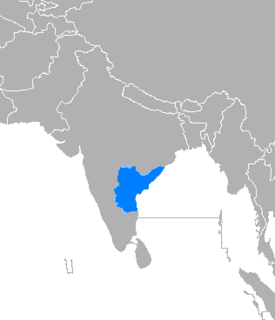
Taḷḷapāka Annamācārya was a 15th-century Hindu saint born to Lakkamamba and Narayana Suri,and is the earliest known Indian musician to compose songs called sankirtanas in praise of the god Venkateswara, a form of Vishnu. He is the first known composer in carnatic music. Other composers like Purandaradasa came after him. The musical form of the keertana songs that he composed, which are still popular among Carnatic music concert artists, have strongly influenced the structure of Carnatic music compositions. Annamacharya is remembered for his saintly life, and is honoured as a great devotee of Vishnu by devotees and saintly singers.

Annamayya is a 1997 Telugu biographical devotional film produced by V. Doraswamy Raju under the VMC Productions banner, directed by K. Raghavendra Rao. It stars Akkineni Nagarjuna, Mohan Babu, Suman, Ramya Krishna, Bhanupriya, Roja and Kasturi playing the lead roles, with music composed by M. M. Keeravani. The film was recorded as a Blockbuster at the box office. Later in the year 2006 the movie was dubbed in Hindi by Tirupati Shree Balaji. The film portrays the life of the 15th century composer, Annamacharya. Upon release, The film received positive reviews and won eight Nandi Awards, three Filmfare Awards and two National Film Awards. The film was premiered at the 1998 International Film Festival of India in the mainstream section.

Telugu literature or Telugu Sahityam is the body of works written in the Telugu language. It consists of poems, novels, short stories, dramas and puranas. Telugu literature can be traced back to the early 10th century period followed by 11th century period when Mahabharata was first translated to Telugu from Sanskrit by Nannaya. It flourished under the rule of the Vijayanagara Empire, where Telugu was one of the empire's official languages.
Dhurjati was a Telugu poet in the court of the king Krishnadevaraya and was one of the astadiggajalu there.
Telugu poetry is verse originating in the southern provinces of India, predominantly from modern Andhra Pradesh, Telangana and some corners of Tamil Nadu and Karnataka.

Koduri Marakathamani Keeravaani, better known as M. M. Keeravani, is an Indian film music composer and playback singer, who works in Telugu, Tamil, Kannada, Malayalam and Hindi cinema. He is also known by his aliases Marakathamani, Vedanarayana and M. M. Kreem. He has recorded most of his songs with singers S. P. Balasubrahmanyam, K. S. Chithra. In 1997, he was awarded the National Film Award for Best Music Direction for the Telugu movie Annamayya. He has won 8 Filmfare Awards, eleven state Nandi Awards and a Tamil Nadu State Film Award.
K. Raghavendra Rao is an Indian film director, producer, screenwriter and choreographer, known for his works predominantly in Telugu cinema and a few Hindi and Kannada films. He has garnered seven state Nandi Awards, the IIFA Award, the SIIMA Award, five Filmfare Awards South and two CineMAA Awards. In a film career spanning more than five decades, Rao has directed more than a hundred feature films, of which around ninety were box office hits, across multiple genres such as romantic comedy, fantasy, melodrama, action thriller, biographical and romance films.
Charles Philip Brown was a British official of the East India Company. He worked in what is now Andhra Pradesh, and became an important scholarly figure in Telugu language literature.
Tallapaka Tirumalamma or Timmakka was a famous Telugu poet who wrote Subhadra Kalyanam in Telugu. She was wife of famous singer-poet Annamacharya and was popularly known as Timmakka.

Tarigonda Vengamamba, also known as Matrusri Tarigonda Vengamamba, was a poet and staunch devotee of Lord Venkateswara in the 18th century. She wrote numerous poems and songs.
Narasimha Satakam is a compilation of 100 poems by Seshappa. They are primary based on devotion and morality and set in simple language.
Mallampalli Sarabheswara Sarma, popularly known as 'Sarabhayya', was a well-known Indian poet, critic, translator and exponent of classical literature.
Dasarathi Satakam is a Telugu Bhakti Satakam, a popular form of Telugu poetry. It was written by Kancharla Gopanna during 17th century. It consists of 104 poems. Dasarathi means son of Dasaratha, who is the mythological Hindu king Rama. The makutam for all tgj poems at the end dASarathee karuNApayOnidhee! .kancherla gopanna is very devoted on lord rama so he sang so many songs on him with makutam dasarathi.
Sumati Shatakam is one of the most famous Telugu Shatakam. It is a neeti (moral) Shatakam.
Sumati or Sumathi may refer to:
Simhadri Narasimha Satakam is a compilation of Telugu poems by Gogulapati Kurmanatha Kavi in the 18th century. He wrote this Satakam extenpore in praise of Lord Varaha Narasimha of Simhachalam.

"Atmopadesa Śatakam" is a Malayalam spiritual work by Narayana Guru in the form of a poem. It is considered as the classic work of Narayana Guru, who was a social reformer and spiritual leader of Kerala, India. The literal translation of the title means "One Hundred Verses of Self Instruction". "Atmopadesa Śatakam" contained 100 verses or stanzas, each of which describing a set of actions performed by the self on itself, affecting and recognising moments of transformation into an absolute value.
Adipudi Somanatharao (1867 - 1941) was a writer and social reformer.







